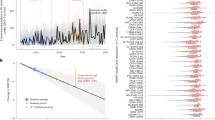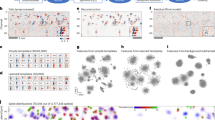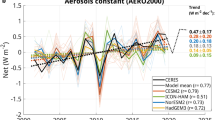Abstract
IN the issue of NATURE of November 6, p. 662, Sir Joseph Larmor directs attention to the fact that during the magnetic storms of October 14 and 15, the Canadian beam signals were greatly reduced in strength. The explanation that appeals to me is connected with the fact that ionic refraction is not the only factor which determines long distance short wave (λ < 60 m.) transmission. Together with this there is the effect of energy absorption by collisions of electrons with molecules. That this absorption plays an important part in transmission seems to me to be upheld by a considerable body of evidence, not the least of which is that afforded by the action of magnetic storms.
This is a preview of subscription content, access via your institution
Access options
Subscribe to this journal
Receive 51 print issues and online access
$199.00 per year
only $3.90 per issue
Buy this article
- Purchase on Springer Link
- Instant access to full article PDF
Prices may be subject to local taxes which are calculated during checkout
Similar content being viewed by others
Author information
Authors and Affiliations
Rights and permissions
About this article
Cite this article
ECKERSLEY, T. Magnetic Storms and Wireless Communication. Nature 118, 803–804 (1926). https://doi.org/10.1038/118803b0
Issue Date:
DOI: https://doi.org/10.1038/118803b0
Comments
By submitting a comment you agree to abide by our Terms and Community Guidelines. If you find something abusive or that does not comply with our terms or guidelines please flag it as inappropriate.



